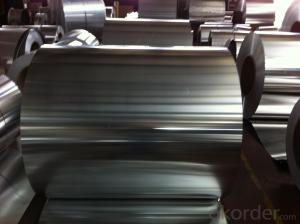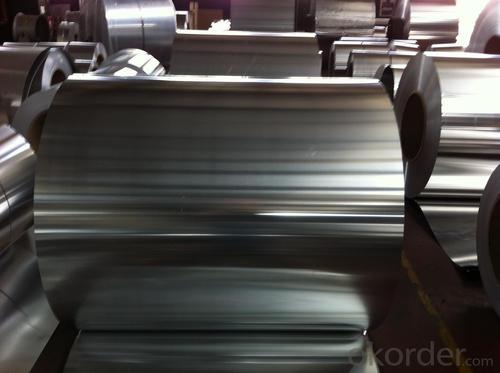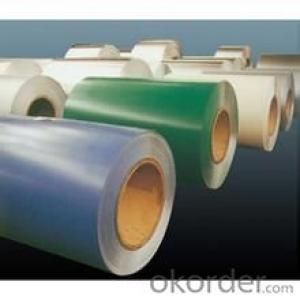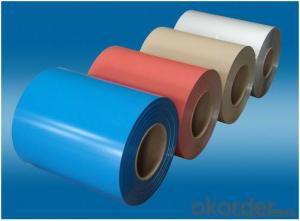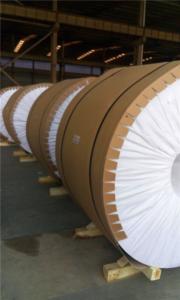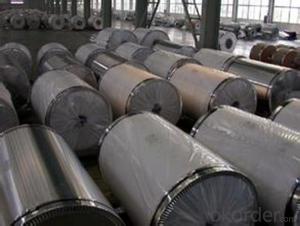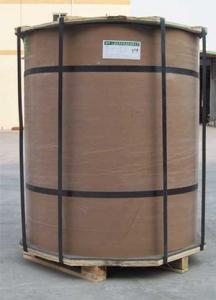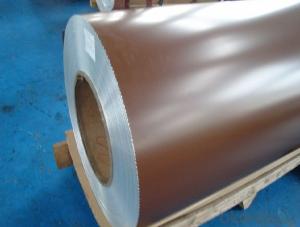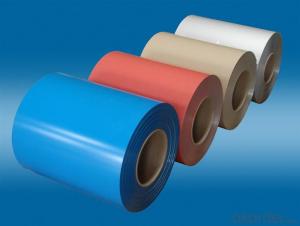Aluminum Coil Sales Pittsburgh - 3.5mm Aluminium Coil
- Loading Port:
- China Main Port
- Payment Terms:
- TT OR LC
- Min Order Qty:
- -
- Supply Capability:
- -
OKorder Service Pledge
Quality Product, Order Online Tracking, Timely Delivery
OKorder Financial Service
Credit Rating, Credit Services, Credit Purchasing
You Might Also Like
Specifications
1:mill finish aluminum coil coil weight:2000kg-2500kg
2:ISO9001,SGS,CCS test certificate
3:Width can reach 2500mm.
4:DC and CC material is available.
mill finish aluminum coil
| Product | Aluminum Coil |
| Alloy | 1050, 1060, 1070,1080,1085,1100, 1200,1145 3003, 3004,3005, 3102,3103,3104,3105, 3A21 5052,5052A,5657, 5754,5082,5083,6061,7075,8006,8011,8079 |
| Temper | O, H12, H14, H16,H18 H22,H24,H26,H28,H32,H34,H36,H38 |
| Thickness | 0.2mm-7.0mm(Or Customer's requirement) |
| Width | Under 2500mm |
| Lead Time | Within 20 days after receiving deposit |
| Packing | Standard Exporting wooden pallets |
| Surface: | Bright & Smooth Surface, Free from defects like white Rust, Oil Patch, Edge Damage. |
| Application | PP cap stock, hot rolled thick plate, PS base plate, aluminum curtain wall base plate, the traffic sign ,air-conditioner heat and exchangers, food container, household foil, pharmaceutical packing, cigarettes packing, |
- Q: How are aluminum coils used in the production of electrical conductors?
- Aluminum coils are widely used in the production of electrical conductors due to their excellent electrical conductivity and lightweight properties. These coils are typically made from high-grade aluminum alloy, which ensures optimal electrical performance. In the production process, aluminum coils are first formed into thin, flat strips. These strips are then further processed through various techniques such as rolling, annealing, and drawing to achieve the desired shape and dimensions of the electrical conductor. Once the aluminum coil has been processed and formed, it is typically coated with a thin layer of insulating material, such as enamel or varnish, to prevent electrical leakage and ensure proper insulation. This coating also protects the conductor from corrosion and other environmental factors. Aluminum coils are commonly used in the production of electrical conductors, such as wires and cables, due to their high conductivity and ability to efficiently carry electrical current. They are especially preferred in applications where weight is a crucial factor, such as in the aerospace and automotive industries. Furthermore, aluminum coils offer cost advantages compared to other materials, making them a popular choice for electrical conductor production. Their lightweight nature also allows for easier installation and handling, reducing labor costs and time. Overall, aluminum coils play a vital role in the production of electrical conductors, providing excellent electrical conductivity, lightweight properties, and cost advantages. Their versatility and efficiency make them a preferred choice in various industries where electrical conductivity is crucial.
- Q: Are aluminum coils suitable for architectural facades?
- Yes, aluminum coils are suitable for architectural facades. They are lightweight, durable, corrosion resistant, and can be easily formed into various shapes and sizes. Additionally, aluminum coils offer a wide range of finishes and colors, making them a versatile choice for architectural facades.
- Q: Are aluminum coils suitable for lightweight applications?
- Aluminum coils are well-suited for lightweight applications due to their advantageous properties and lightweight nature. With a density about one-third that of steel, aluminum is a lightweight metal that is ideal for prioritizing weight reduction. In various industries such as aerospace, automotive, electronics, and packaging, aluminum coils are commonly used for their excellent strength-to-weight ratio, corrosion resistance, and thermal conductivity. Moreover, they offer versatility in design and manufacturing as they can be easily formed, welded, and machined.
- Q: Are there any restrictions on the coil surface quality of aluminum coils?
- Aluminum coils have specific limitations when it comes to their surface quality. The quality of the coil's surface is crucial as it impacts both the overall performance and appearance of the final product. Various restrictions are in place to maintain the coil's surface quality, including the following: 1. Surface defects: Visible imperfections like scratches, pits, dents, or cracks should not be present on aluminum coils. These defects can hinder the coil's functionality and affect the aesthetic appeal of the end product. 2. Surface smoothness: The surface of aluminum coils should possess a uniform and smooth finish. Excessive roughness can hinder the adhesion of coatings or paints and affect the coil's ability to be shaped as desired. 3. Surface cleanliness: Aluminum coils should be devoid of contaminants such as dirt, oil, or grease. These impurities can interfere with subsequent processes like painting, coating, or bonding, and impact the overall performance of the coil. 4. Surface oxidation: Aluminum is prone to oxidation, resulting in the formation of a thin oxide layer on the surface. While a certain level of oxidation is acceptable, excessive oxidation can hinder the adhesion of coatings or paints and affect the coil's resistance to corrosion. 5. Surface flatness: Aluminum coils should possess a flat and even surface. Any waviness or unevenness can cause complications during subsequent manufacturing processes like stamping, bending, or rolling. Maintaining these restrictions on coil surface quality is essential to ensure that aluminum coils meet the desired specifications and can be effectively utilized in various industries, including automotive, construction, packaging, and electrical.
- Q: What are the different types of aluminum coils available?
- There are several types of aluminum coils available, including painted coils, embossed coils, brushed coils, anodized coils, and perforated coils. Each type offers unique characteristics and applications, catering to various industries and aesthetic preferences.
- Q: How are aluminum coils used in the production of musical instruments?
- Aluminum coils are commonly used in the production of musical instruments, particularly in wind instruments like saxophones and trumpets. These coils are shaped into a specific design and attached to the instrument to create the desired sound. The aluminum material allows for a lightweight and durable construction, enhancing the instrument's playability and resonance.
- Q: What are the rules and regulations concerning the disposal of old aluminum coils?
- <p>Yes, there are regulations on the disposal of old aluminum coils. These regulations vary by country and region, but generally, they aim to prevent environmental pollution and promote recycling. In the United States, for example, the Environmental Protection Agency (EPA) sets guidelines for recycling and disposing of scrap metal, including aluminum. Businesses and individuals are often required to recycle aluminum coils rather than sending them to landfills. Proper disposal may involve sorting, cleaning, and sending the coils to recycling facilities that can process and reuse the material. Violations of these regulations can result in fines and penalties. It's important to check local and national regulations for specific requirements.</p>
- Q: Can aluminum coils be used in the production of aluminum doors?
- Aluminum doors can be produced using aluminum coils. Typically, aluminum coils serve as a raw material in the manufacturing process of aluminum doors. These coils are constructed from top-notch aluminum alloy and are available in varying thicknesses and widths. They can easily be molded into different shapes and sizes to fulfill the particular requirements of the doors. Furthermore, aluminum coils possess characteristics such as lightweightness, durability, and resistance to corrosion, making them an excellent option for door production. The coils are commonly subjected to various techniques like cutting, bending, and welding to fabricate the desired door components. All in all, aluminum coils offer numerous advantages in terms of versatility, strength, and aesthetics, which explains their popularity among aluminum door manufacturers.
- Q: How do aluminum coils perform in extreme weather conditions?
- Aluminum coils are renowned for their outstanding performance in challenging weather conditions. With their inherent properties, aluminum coils exhibit remarkable resistance to corrosion, rendering them ideal for usage in areas with high humidity, coastal regions, and locations susceptible to acid rain or industrial pollution. Furthermore, aluminum coils possess a high melting point, enabling them to endure extreme heat without warping or distorting. In frigid weather, aluminum coils demonstrate exceptional durability and do not become brittle like some alternative materials. They maintain their structural integrity, ensuring optimal performance even in freezing temperatures. Additionally, aluminum coils possess excellent thermal conductivity, enhancing their efficiency in heat transfer and defrosting capabilities, crucial for HVAC systems operating in cold weather conditions. In hot and humid climates, aluminum coils excel in resisting corrosion, preventing moisture accumulation, and sustaining their efficiency. Crafted to withstand high humidity levels, they prevent the growth of mold or bacteria that could compromise indoor air quality. Moreover, the lightweight nature of aluminum coils aids in dissipating heat rapidly, improving overall cooling performance and energy efficiency. Furthermore, aluminum coils exhibit remarkable durability and can endure extreme weather events, including hurricanes, strong winds, and hailstorms. Engineered to be robust and impact-resistant, they withstand harsh weather conditions without sustaining damage. Overall, aluminum coils have proven their reliability and effectiveness in extreme weather conditions, delivering long-lasting performance and durability. Their corrosion resistance, ability to withstand high and low temperatures, and capacity to endure severe weather events make them an excellent choice for diverse applications, such as HVAC systems, refrigeration units, and outdoor equipment.
- Q: I'm asking about the aluminum tabs on soda cans. I've heard mixed things.
- Yes, if you are willing to drive and deliver the aluminum tabs to a recycling site, you can probably be reimbursed for the tabs. However, if you'd rather just donate them to a great cause, you can send them to Shriner's Hospitals, or someone you know locally who is involved with Shriner's. I'm sure they would gladly deliver them when they visit with thier sick child for treatment at these free hosiptals! If you don't know of anyone who uses the Shriner's Hospital services, please email me back and I'll make arrangements for your pop-tabs to get to the Shriner's Hospital in Philadelphia, PA every 3 months or so. My child visits them every 3 months!!!!
Send your message to us
Aluminum Coil Sales Pittsburgh - 3.5mm Aluminium Coil
- Loading Port:
- China Main Port
- Payment Terms:
- TT OR LC
- Min Order Qty:
- -
- Supply Capability:
- -
OKorder Service Pledge
Quality Product, Order Online Tracking, Timely Delivery
OKorder Financial Service
Credit Rating, Credit Services, Credit Purchasing
Similar products
Hot products
Hot Searches
Related keywords
